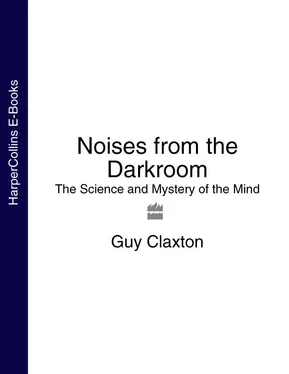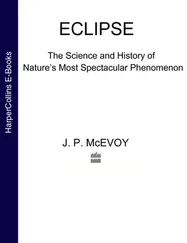Noises from the Darkroom
The Science and Mystery of the Mind
Guy Claxton

Title Page Noises from the Darkroom The Science and Mystery of the Mind Guy Claxton
Epigraph Epigraph Our minds lie in us like fish in the pond of a man who cannot fish. Ted Hughes It is the impossible job of the mystic, if he wishes to try to teach what he knows, to scrute the inscrutable, speak the unspeakable, and eff the ineffable. Alan Watts
Foreword
PART I: EVOLUTION OF THE MIND
Chapter 1 Science and Mystery
Chapter 2 Body-Building: The Origins of Life
Chapter 3 The Plastic Brain
Chapter 4 The Self-Organizing Organizer
Chapter 5 Mosaic Mind
Chapter 6 The Pressures of Society
Chapter 7 Languaging the Brain
PART II: THE STORY OF THE SELF
Chapter 8 The Language of the Self
Chapter 9 Affluence, Leisure and Learning
Chapter 10 Identity and Survival
Chapter 11 Accentuate the Permanent: the Narrative Self
PART III: THE EMERGENCE OF CONSCIOUSNESS
Chapter 12 Alarums and Excursions
Chapter 13 Feelings and Seeings
Chapter 14 The Circumcision of Consciousness
Chapter 15 The Cultivation of Ignorance
Chapter 16 Stupidity: the Retardation of Perception
Chapter 17 Myths to Live By
PART IV: UNCONSCIOUSNESS REGAINED
Chapter 18 Myths of the Mind
Chapter 19 Unconsciousness — The Essential Mystery
Chapter 20 The Reconsecration of Unconsciousness
Chapter 21 The Restoration of Sanity
Notes
Index
About the Author
Praise
Copyright
About the publisher
Our minds lie in us like fish in the pond of a man who cannot fish.
Ted Hughes
It is the impossible job of the mystic, if he wishes to try to teach what he knows, to scrute the inscrutable, speak the unspeakable, and eff the ineffable.
Alan Watts
The human mind is mysterious in two fundamentally different ways. It is mysterious in the sense that we do not yet have a clear understanding of how it works. Penetrating this mystery is the job of science, and there is, currently, a flurry of very fruitful and exciting activity going on in laboratories and seminar rooms around the world. One of the aims of this book is to provide a reader-friendly synthesis of, and some novel contributions to, this research. The approach of ‘cognitive science’, as it is called, sees the mystery of the mind as a temporary fog of incomprehension which precise experimentation and smart theorizing will eventually dispel.
But the mind is mysterious in a much more profound and indelible sense – and this meaning of mystery is not scientific but religious. The great spiritual traditions of the world agree that a brush with God is a close encounter of an essentially mysterious kind. The more clearly we see, the more obvious it becomes that at the very heart of human experience there is an ineffable Something, greater by far than the human mind could ever, in principle, encompass. ‘The peace of God passeth all understanding’, and ‘God moves in a mysterious way’, not because we don’t yet have enough data about the Almighty, but because He/She/It/They are fundamentally, intrinsically enigmatic. And that enigma, so the mystical explorers tell us, is not remote but present, accessible in every moment of mundane human experience. Thus the larger aim of this book is to bring these two meanings of ‘mystery’ into conjunction, and to show how science, by clarifying what it is to be a living human being, demands that we remember the invisible bedrock on which we are built. For our modern intuitive understanding of our own psychology leaves it out. And this oversight is not a matter of academic interest, but of vital personal and even global significance.
Not to put too fine a point on it, the world is in a mess because the human mind is in a mess. The problems we face are not at root technological, political or economic; they are psychological and spiritual. And the mind is in a mess because it misunderstands itself. We pollute the skies and ruin the earth because we are confused about who and what we are. It is because of our improper and unjust relationship with our own psychology that some of us plough up fields of good wheat while others of us are starving; some of us confess to murders that others of us have committed. Every culture lives within an invisible myth; and a central part of that myth, the most invisible of all, concerns human nature. Our culture has developed a particularly disastrous mind-myth, and while that myth remains unconscious and unexamined, we will continue to wreck the nest and hurt each other.
One of the symptoms of the mind’s disease is that it will go to great lengths to examine every conceivable option except the right one. It will think endless new thoughts, but has extreme difficulty in scrutinizing that-which-thinks. The fundamental strategic problem of our time, therefore, is how to get individual minds, in sufficient quantities and with sufficient speed, to embark enthusiastically on the requisite process of demythologization-brain-washing, in the sense of laundering away our misconceptions, you might say. If cognitive science can demonstrate to rational minds how and why they have expurgated their own mystery, and what it has cost them to do so; if it can open our ears to the noises from the darkroom and make us wonder about them, then it will have proved itself valuable as well as merely interesting.
The science on which we have to draw is biological and psychological. Twenty years ago, the dialogue between science and religion was revitalized by the appearance of Fritjof Capra’s classic The Tao of Physics, and since then there have been many attempts to account for the basic mysteries of human spirit and consciousness in terms of the fascinating concepts of cosmological and particle physics. But these accounts, it has turned out, while they offer intriguing metaphors and allegories, are not real explanations at all. Heisenberg’s ‘uncertainty principle’, however powerful in the world of the atomic nucleus, tells us nothing of interest about the emergent properties of brains and minds – just as the study of liver disease in principle cannot explain the Nuremberg rallies. 1Spirituality is a phenomenon of whole human beings embedded in their biological and social worlds, and it is therefore from the shores of brain science, evolutionary biology, and transpersonal psychology that we have to build out towards the far bank of mystery.
It is a pleasure to acknowledge some of the major bridge-builders in this area, whose masterly construction work has enabled me to reach out as far as I have. Not all of them will approve of the uses to which I have put their work, but without them it would not have been possible. There are the founders of systems theory, such as Ludwig von Bertalanffy, and Gregory Bateson with his famous search for ‘the pattern which connects’. There are those who have forged links between religion (a word whose root meaning is itself ‘to bind back together’) – especially the Eastern traditions of Taoism, Hinduism and Buddhism – and forms of Western psychology: most notably Alan Watts and his ‘dharma heir’ Ken Wilber. More recently there are the pioneers of ‘ecopsychology’ such as Warwick Fox and Theodore Roszak. And then there are psychologists such as Nicholas Humphrey and Robert Ornstein, whose informed speculations about the evolution of mind and consciousness have contributed much to the development of my own thought. The fact that I have come to the conclusion that the origins of the unconscious are much more important than those of consciousness in no way detracts from my debts to them. Finally there are the cognitive scientists, whose bold ideas about the nature of brain, mind and self have contributed perhaps most of all to the story that I want to tell. I am thinking especially of philosopher Daniel Dennett, and neuroscientists Gerald Edelman and Michael Gazzaniga. To all of these, and many others, my thanks for their building materials.
Читать дальше













